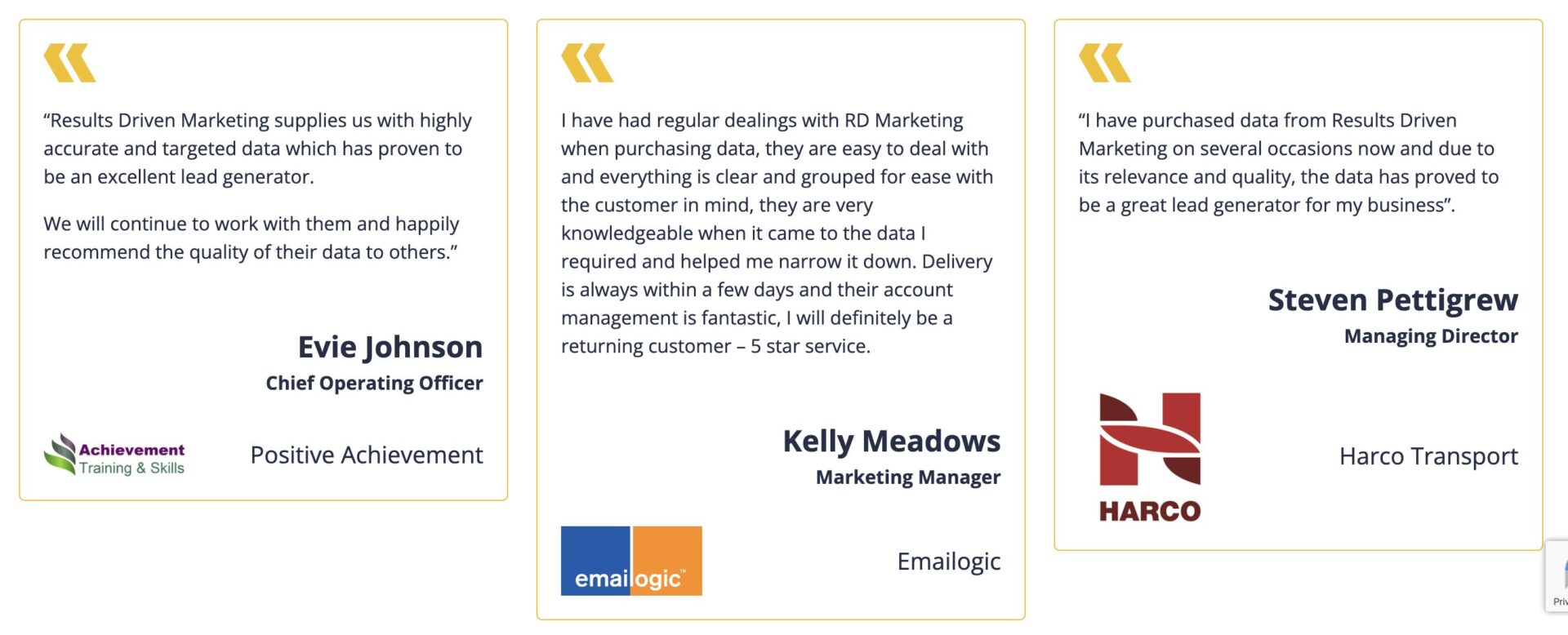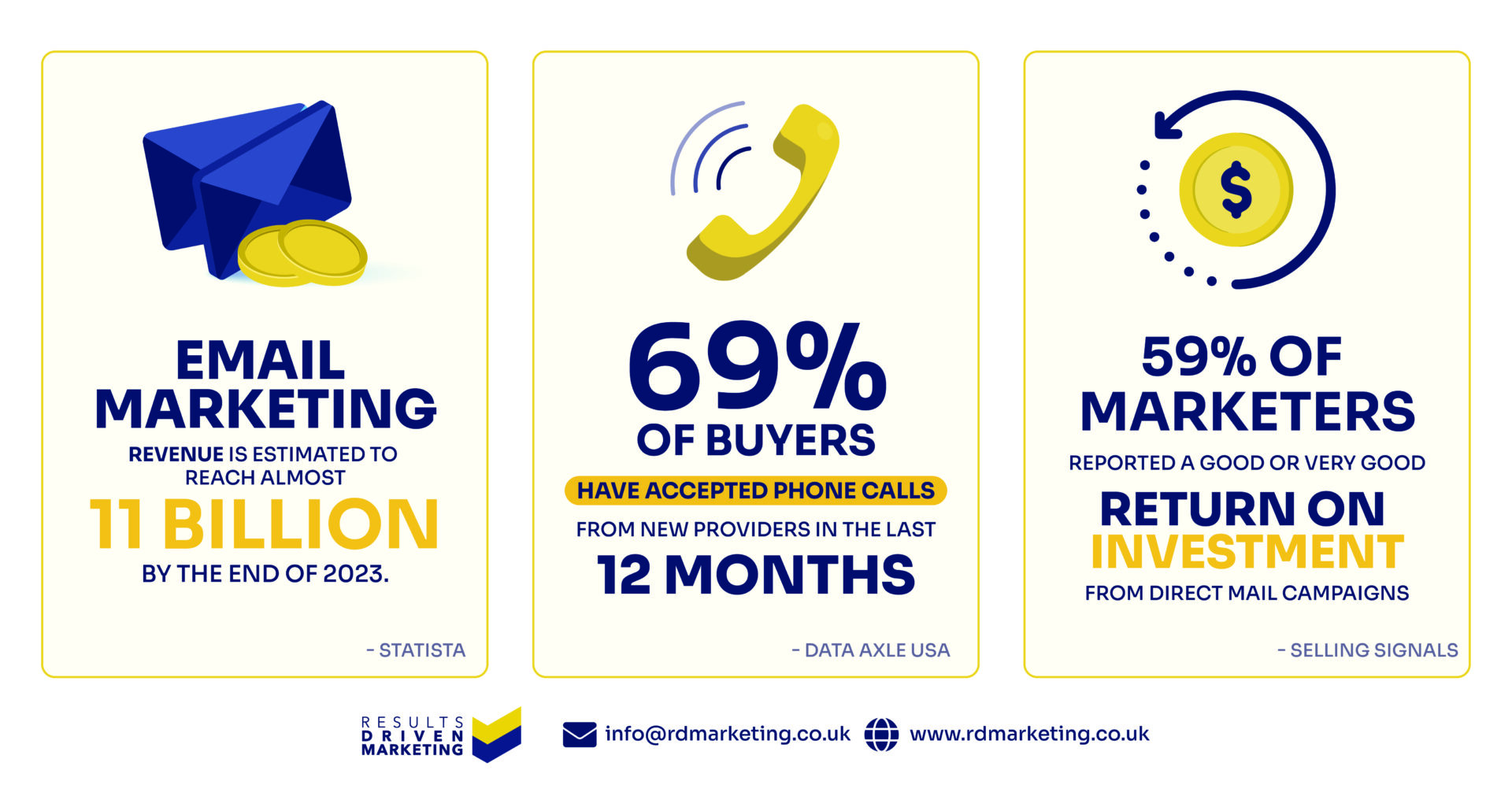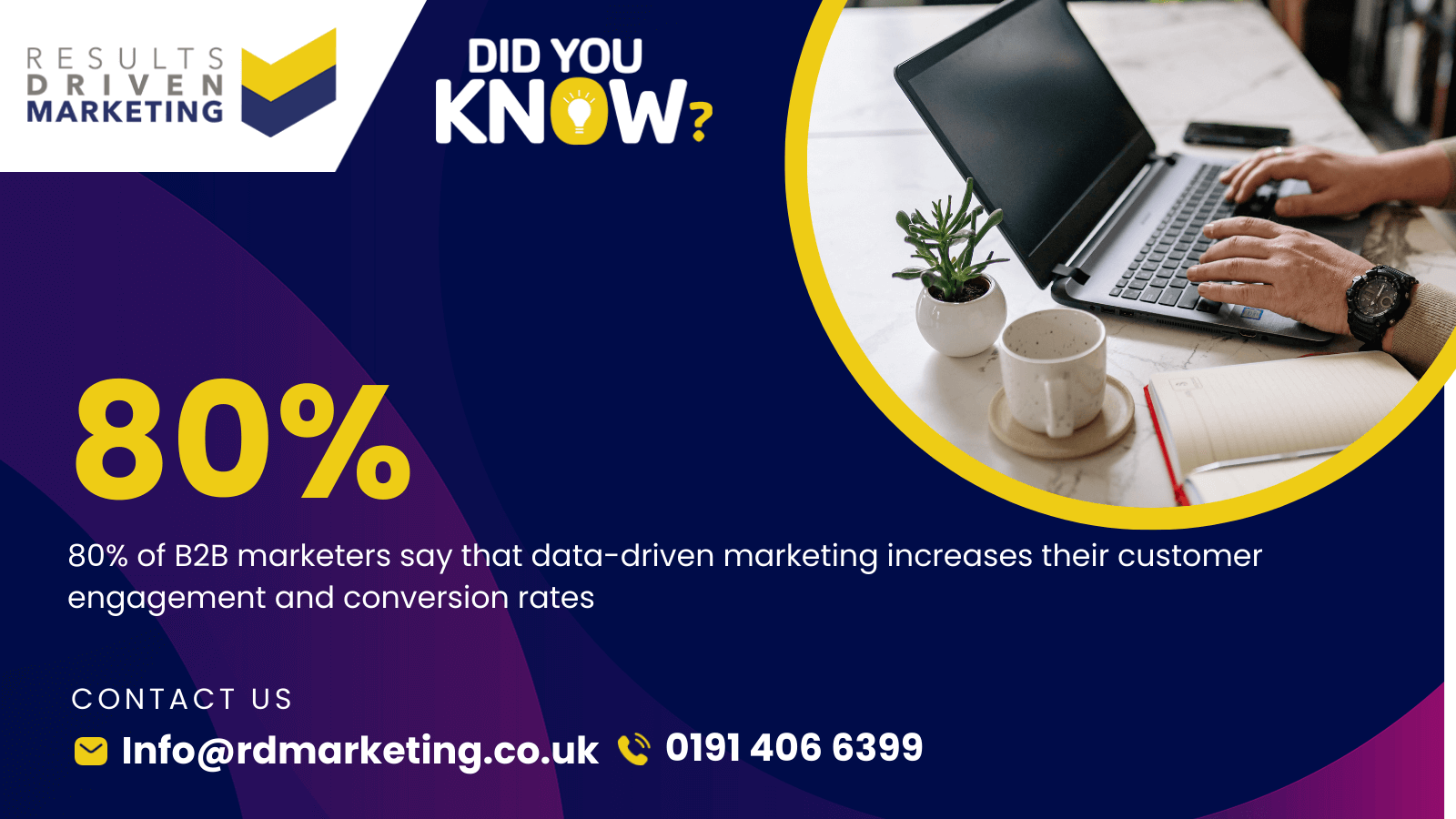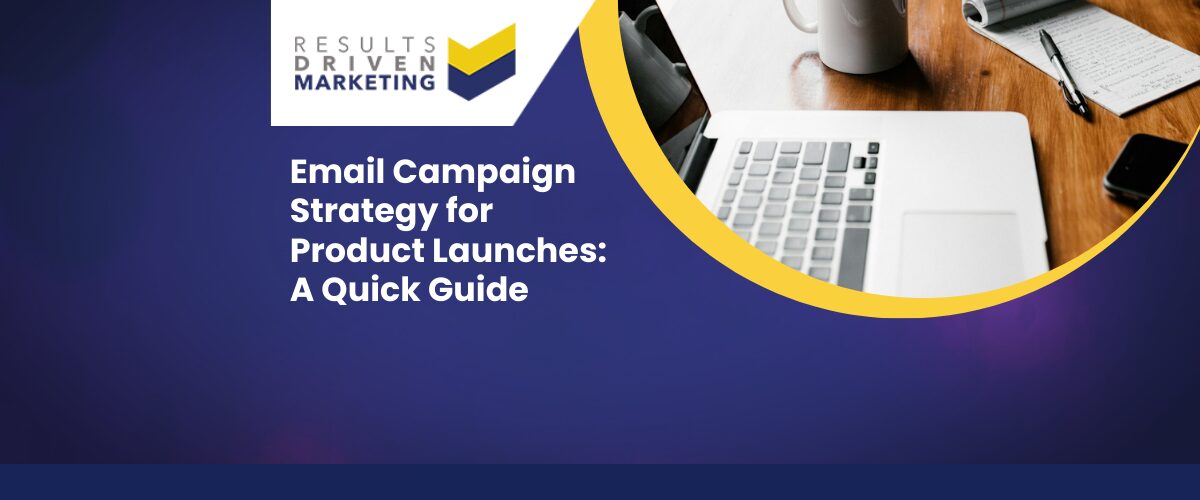
Email Marketing Data for Targeted Outreach
Email marketing data is the backbone of every successful campaign, ensuring your message reaches the right decision-makers and delivers consistent results. When your email marketing database is accurate, clean, and up to date, it becomes far easier to personalise your messaging, boost engagement, and improve overall campaign performance.
A well-maintained email marketing database also strengthens segmentation, enhances deliverability, and increases open and click-through rates. And for businesses ready to scale their outreach, many choose to buy B2B data to expand into new markets with confidence and precision.
By combining your email marketing data with supportive services such as Data Cleansing Services or Direct Mail Data, you create a more powerful, multi-channel strategy that keeps your brand visible and relevant to the people who matter most.
Table of contents:
What Is Email Marketing Data?
Email marketing data is a list of contacts that businesses use in email platforms or campaigns to reach their target audience. It typically includes key details such as names, email addresses, job titles, and company information, allowing businesses to tailor their outreach to the right individuals.
Using accurate and reliable data is essential for the success of your campaigns. It helps ensure that your messages reach the right decision-makers, increasing the chances of engagement and conversions. Whether you’re promoting a product, sharing updates, or nurturing leads, email marketing data forms the foundation of your communication strategy.
Understanding and using high-quality targeted email marketing data empowers your business to:
- Target key decision-makers directly.
- Personalise campaigns to improve engagement.
- Optimise marketing efforts to save time and resources.
By leveraging targeted email marketing data effectively, you can create impactful campaigns that resonate with your audience and drive real results.
Why Your Email Marketing Database Is the Foundation of Every High-Performing Campaign
A strong email marketing database sits at the heart of every successful email strategy. When your data is accurate, clean, and aligned with your ideal audience, everything becomes easier. Messages land in the right inboxes. Your personalisation becomes more meaningful. Your engagement rates increase. And your campaigns deliver measurable, predictable results.
What Makes an Email Marketing Database So Valuable?
Your email marketing database is far more than a list of email addresses. It’s a strategic asset that guides who you contact, how you communicate, and the results you achieve. With high-quality, decision-maker data, businesses can:
-
Send personalised and relevant campaigns that resonate
-
Improve open and click-through rates
-
Reduce wasted sends and protect deliverability
-
Target new decision-makers with confidence
When your data is strong, your entire marketing engine becomes more efficient.
How a Quality Email Marketing Database Enhances Every Stage of Your Campaign
A well-structured database influences every part of your marketing workflow:
Better Segmentation
Accurate fields such as industry, job title, company size, and region allow you to tailor your messaging so the right people receive the right content at the right time.
Stronger Personalisation
Personalisation drives engagement. When your data includes up-to-date details, you can craft messages that feel specific, relevant, and timely.
Higher Deliverability
Clean, compliant data reduces bounces and spam risks, helping your campaigns reach inboxes consistently.
Easier Scaling
Businesses ready to expand their reach often choose to buy B2B data to increase volume without compromising quality. A solid starting database ensures any new data blends seamlessly into your strategy.
Why Maintaining Your Email Marketing Database Matters
Even the best data declines over time. Job titles change, companies restructure, and inboxes go dormant. A neglected database leads to falling engagement and reduced ROI.
Regular cleansing, enrichment, and restructuring help your email marketing database:
-
Stay compliant
-
Stay accurate
-
Support long-term performance
-
Continue to target real, relevant decision-makers
It transforms your database from a static file into a living, powerful asset that fuels ongoing growth.
How to Use an Email Marketing Database to Generate More Leads
A strong email marketing database is one of the fastest ways to build a predictable pipeline, especially when you want to reach UK decision-makers at scale. The key is not simply having contacts, it’s using the data properly so your outreach feels relevant, lands in the inbox, and consistently drives replies.
If you are relying on general email lists without clear targeting, you often end up with low engagement and inconsistent results. A well-structured email marketing database gives you the ability to segment properly, personalise confidently, and build campaigns that improve over time.
Start with Segmentation That Matches Buying Intent
To generate leads, you need your email marketing database split into segments that reflect real-world buying behaviour. That could mean grouping contacts by industry, company size, region, or job role. The tighter the segment, the easier it is to write emails that feel specific and valuable.
Segmentation also helps you test different angles quickly. Instead of guessing what works, you can run small campaign drops, measure responses, and then scale the best-performing segments.
Build a Simple Email Engine You Can Repeat
The best results come from consistency. A good approach is to run short campaigns in cycles, using your email marketing database to:
-
Send an initial email with a clear value-led message
-
Follow up with a reminder and a different angle
-
Add a final check-in that invites a response
This gives you a repeatable process that works across different sectors and offers, without needing to reinvent your approach every time.
When It Makes Sense to Expand with External Data
Once your internal data is performing, growth often comes from expanding into new segments. This is where many businesses choose to buy email lists to reach new decision-makers and test new markets faster.
The important part is quality and fit. External data should blend into your existing targeting and segmentation so your email marketing database stays clean and usable, rather than becoming a dumping ground of mixed contacts.
How to Expand Your Email Marketing Database Without Losing Quality
Growing your email marketing database is often the fastest route to more conversations, more enquiries, and more revenue. But scaling only works when quality stays high. If you add volume without structure, your targeting becomes messy, deliverability drops, and performance becomes unpredictable. The goal is to expand your email marketing database in a way that strengthens your segmentation, keeps campaigns relevant, and protects your sender reputation.
For many businesses, growth comes from blending internal data with carefully selected external records. That might mean refreshing old contacts, adding new sectors, or reaching different decision-makers within the same industries. This is where companies often choose to buy database selections that match their Ideal Customer Profile, rather than relying on broad, generic files that dilute results.
When It Makes Sense to Add External Data
If your current database is performing well, expansion becomes a logical next step. You may want to:
-
Enter a new industry or niche market
-
Increase volume within a proven segment
-
Target new job roles within the buying committee
-
Broaden geographic coverage across the UK
In these scenarios, many teams choose to buy business data to accelerate outreach while keeping targeting tight. The key is selecting records that fit your existing campaign structure. When the data aligns with your email marketing database, you can launch new campaigns quickly without compromising personalisation or segmentation.
Keep Your Segmentation Strong as You Scale
As your database grows, segmentation becomes even more important. A larger email marketing database only helps if you can still control who receives what. That is why the best approach is to add data in a way that supports clear segments such as:
-
Industry or sector
-
Company size and turnover bands
-
Region, city, or postcode areas
-
Job role, department, and seniority
This is also where email marketing lists add value. Instead of treating all contacts as one pool, you can organise your database into purposeful groups that match specific messages and offers. The same principle applies if you are building broader mailing lists for ongoing nurture activity, where consistency and relevance matter more than volume.
Think Multi-Channel, Not Just Email
Scaling your email marketing database becomes even more powerful when it supports multi-channel outreach. Email works well on its own, but performance often improves when it sits alongside other touchpoints such as direct mail and calling. If you plan to combine channels, it is worth choosing data that can support both email and phone activity.
This is where working with experienced telemarketing list providers can help, especially when you want connected datasets that allow you to follow up email engagement with targeted calls. The result is a more coordinated approach, where your email outreach creates familiarity and your follow-up activity drives responses.
How to Choose the Right Email Marketing Database for Your Business
Choosing the right email marketing database is one of the most important decisions you will make for your campaigns. The quality and structure of your email marketing database will influence everything from deliverability and engagement to ROI and long term customer relationships.
A clear process helps you avoid guesswork and ensures you invest in data that actually supports your goals instead of holding you back.
Start With a Clear Picture of Your Ideal Audience
Before you even look at a provider, get specific about who you want to reach. A good email marketing database should reflect your ideal customers, not just “any business with an email address.”
Ask yourself:
-
Which sectors or industries are you targeting?
-
Do you want UK wide coverage, or specific regions, cities, or postcodes?
-
What size of company is most relevant, for example micro businesses, SMEs, or larger organisations?
-
Which job roles or seniority levels usually make the buying decisions?
Once you are clear on this profile, you can brief a provider properly and ensure your email marketing database is built around your real decision-makers, not just generic contacts. At Results Driven Marketing this is where services like our B2B Data and Email Address List Data come into play, because they are tailored around your ideal customer rather than pulled from a one size fits all file.
Match Your Email Marketing Database To Your Campaign Plan
The best database for you will depend on how you plan to use it. Different strategies need different types of information.
Think about:
-
Will you run pure email campaigns, or do you also want to support direct mail and telemarketing?
-
Do you need extra fields like phone numbers and postal addresses to support multi-channel outreach?
-
Are you planning one short burst campaign, or ongoing activity where you will need to reuse and refresh the data?
If you intend to combine channels, an email marketing database that sits alongside Direct Mail Data or telemarketing data will give you more ways to reach the same decision-makers. If your focus is long term nurture, you will benefit from ongoing support like Data Cleansing Services and Data Enrichment Services to keep your file usable and up to date.
Key Checks Before You Buy An Email Marketing Database
Finally, before committing to an email marketing database, run through a few essential checks to protect both your budget and your reputation.
-
Ask how the data is sourced and maintained
You want a provider that focuses on accuracy and recency, with a clear process for updating and refreshing records. Stale data leads to bounces, wasted sends, and poor engagement. -
Confirm GDPR compliance
Any email marketing database used to contact UK SMEs must be compliant with GDPR and other relevant regulations. A reputable provider will be able to explain their compliance position clearly and give you confidence that you are working within the rules. -
Check how flexible the selection is
You should be able to select and refine by criteria like industry, geography, company size, and job role. This flexibility is vital if you want to build tightly targeted campaigns rather than broad, unfocused blasts. -
Look at the support on offer
Buying a file is only part of the story. The real value comes when you combine that email marketing database with practical support. At Results Driven Marketing that might include help with data selection, guidance on segmentation, and access to tools such as our Responder platform and managed email marketing services.
When you take the time to define your audience, align the database with your campaign plan, and ask the right questions before you buy, your email marketing database becomes a real asset rather than a cost. It gives you a dependable foundation for reaching senior decision-makers in UK SMEs, improving deliverability, and turning campaigns into measurable revenue.
Why Email Marketing Data Represents a Major Growth Opportunity
High-quality email marketing data gives businesses a direct and scalable way to reach the people most likely to engage, enquire, and buy. In a landscape where attention is limited and competition is high, data-driven email campaigns continue to outperform many broader marketing channels when executed correctly.
Rather than relying on guesswork, email marketing data allows businesses to communicate with specific audiences using targeted messaging and measurable outcomes. When supported by well-structured email lists, this approach creates a powerful opportunity to generate demand and drive consistent results.
Reach the Right People, Faster
Email marketing data enables direct access to relevant decision-makers and influencers within your target market. Instead of broadcasting messages to a wide audience, campaigns can be focused on individuals who match your Ideal Customer Profile. This saves time, reduces wasted spend, and increases the likelihood of meaningful engagement.
Improve Relevance Through Targeting
Effective email campaigns rely on relevance. With accurate email marketing data, businesses can segment email lists by industry, job role, company size, or location, allowing messaging to feel personalised rather than generic. More relevant emails lead to stronger open rates, better response levels, and higher-quality enquiries.
A Cost-Effective Channel With Scale
Email remains one of the most cost-efficient marketing channels available. When combined with reliable email marketing data, it allows businesses to scale outreach without the rising costs associated with paid advertising. One well-built dataset can support multiple campaigns, follow-ups, and long-term nurturing activity.
Clear Performance Insights
Email marketing data supports fully measurable campaigns. Metrics such as delivery rates, opens, clicks, and responses provide clear insight into what is working and what needs improvement. Reliable data ensures performance metrics are meaningful, making it easier to optimise future campaigns and improve ROI over time.
Support Long-Term Engagement
Email marketing data is not just about immediate responses. It allows businesses to stay visible, share value, and maintain regular contact with their audience. Over time, consistent communication builds familiarity and trust, turning prospects into warm leads and repeat customers.
When used strategically, email marketing data represents a significant opportunity for businesses to grow more efficiently. Supported by targeted email lists and relevant messaging, it enables smarter campaigns, stronger engagement, and more predictable results.
How to Strengthen Your Marketing Strategy with High-Quality Email Marketing Data
High-quality email marketing data gives businesses a real competitive edge, especially when they want to reach senior decision-makers quickly and confidently. When your data is accurate, relevant, and aligned with your ideal audience, your entire strategy becomes more predictable. Campaigns perform better. Engagement increases. And your marketing spend becomes far more efficient. It’s also why so many organisations choose to buy B2B data when they’re ready to scale into new sectors or add fresh, high-value decision-makers to their targeting.
Build a More Predictable and Scalable Email Strategy
Precise email marketing data allows you to plan campaigns with clarity. You know exactly who you’re contacting, why they’re relevant, and how to tailor your message to resonate with them. This level of precision leads to:
-
Stronger segmentation and hyper-relevant messaging
-
Higher open and click-through rates
-
Better conversion outcomes across all campaigns
-
A more consistent, scalable pipeline of leads
When your email marketing data is structured well and maintained properly, you stop reacting and start planning proactively.
Improve Campaign Efficiency Across Every Touchpoint
The efficiency of your campaigns improves dramatically when your email marketing data is reliable. Several operational and performance benefits follow:
-
Reduced waste by eliminating irrelevant or outdated contacts
-
Fewer deliverability issues thanks to clean and compliant records
-
More accurate reporting because your metrics reflect real, engaged audiences
-
Stronger personalisation driven by richer, more complete datasets
This makes every email, every follow-up, and every marketing pound work harder.
Expand Into New Markets with Confidence
When a business wants to break into a new vertical, region, or audience group, using internal data alone is rarely enough. This is where many organisations decide to buy B2B data from a trusted provider. It allows you to:
-
Test new markets quickly
-
Add fresh, well-targeted contacts to your strategy
-
Validate new campaign angles
-
Increase volume without sacrificing quality
Combining your internal email marketing data with carefully selected external B2B data creates a more powerful, multi-layered outreach strategy.
How to Use Email Marketing Data to Scale Your Outreach with Confidence
Email marketing data is more than a list of contacts. When used properly, it becomes the engine behind scalable, predictable outreach that consistently reaches the right decision-makers. Whether you’re nurturing existing leads, testing new markets, or planning a full-scale outbound campaign, strong email marketing data gives you the clarity and confidence to take your marketing to the next level. And for businesses looking to expand quickly, many choose to buy email lists from trusted providers to complement their internal datasets and improve targeting accuracy.
Build Campaigns That Grow With Your Business
As your organisation scales, your email marketing data should scale with you. High-quality datasets allow you to:
-
Add new industries, regions, or job roles to your targeting
-
Test fresh segments without disrupting existing workflows
-
Maintain consistent personalisation even as volume increases
-
Support multi-channel campaigns that align email with phone and postal outreach
This flexibility ensures your marketing efforts continue to feel precise, relevant, and impactful, even as you widen your reach.
Use Data Insights to Optimise Every Stage of Growth
Strong email marketing data gives you actionable insights into how your audience behaves. By analysing engagement patterns, bounce trends, and segment performance, you can:
-
Identify your highest-performing audience clusters
-
Build lookalike segments to expand into similar markets
-
Refine messaging to match real decision-maker behaviour
-
Allocate budget toward the campaigns with the strongest ROI
This data-driven approach removes the guesswork from scaling and ensures each expansion step is backed by evidence, not assumptions.
Strengthen Deliverability and Performance as You Grow
Scaling only works when your emails keep landing in the inbox. That’s where clean, compliant email marketing data plays a crucial role. By maintaining data hygiene and regularly refreshing your records, you can:
-
Protect your sender reputation as volumes increase
-
Avoid blocklists and filtering issues
-
Maintain consistent open and click-through rates
-
Reduce waste by eliminating outdated or invalid contacts
When paired with professional cleansing and enrichment services, your email marketing data remains a reliable asset that supports long-term growth.
Who Uses Email Marketing Data?
Our Email marketing data is a valuable resource used by a wide range of clients which connects them to senior purchasing decision-makers within UK SMEs. Here are some of the industries and professionals that benefit from leveraging our high-quality email marketing lists:
1. B2B Service Providers
IT companies, HR consultants, and legal firms use email marketing data to promote their services to SMEs looking for expert solutions.
2. Manufacturers and Distributors
Businesses producing equipment, tools, or consumables use it to reach procurement managers and decision-makers directly.
3. Marketing and Advertising Agencies
Agencies rely on email marketing data to run targeted campaigns for their clients, ensuring high engagement rates and ROI.
4. Financial Service Providers
Banks, insurers, and lenders use email marketing data to connect with SMEs needing tailored financial solutions.
5. Training and Development Companies
Providers of professional workshops and certifications target HR teams and decision-makers to offer skill-building opportunities.
6. Software and Technology Firms
CRM providers, SaaS companies, and cybersecurity experts use email marketing data to promote their products to businesses needing tech solutions.
7. Event Organisers
Trade shows, conferences, and webinars are promoted using email marketing data to invite decision-makers who are likely to attend.
8. Recruitment Agencies
Recruiters use email marketing data to identify SMEs with staffing needs, ensuring their services are well-targeted.
9. Energy and Utility Providers
Utility companies use email marketing data to promote cost-effective services to SME owners and managers.
10. Print and Direct Mail Services
Providers of print services use email marketing data to connect with businesses that value high-quality marketing materials.
Whether your goal is to generate leads, boost brand awareness, or close sales, email marketing data helps you connect with the right people in the right way. It’s a versatile tool for any business looking to expand its reach and drive success.
Why Buy Email Marketing Data from Results Driven Marketing?
When it comes to sourcing reliable email marketing data, Results Driven Marketing stands out as the trusted choice for businesses targeting senior purchasing decision-makers within UK SMEs. Our tailored marketing lists are designed to help you reach the right audience efficiently and effectively. Here’s why you should choose us:
1. High-Quality, Verified Data
Our email marketing data is meticulously verified and regularly updated to ensure accuracy. With our lists, you’ll confidently connect with decision-makers who have the authority to act, improving your campaign success rates.
2. Tailored to Your Needs
Every business has unique goals, and our email marketing data reflects that. We offer customised lists segmented by industry, company size, or location, ensuring your campaigns are laser-focused on your target audience.
3. GDPR-Compliant and Reliable
We take compliance seriously. All our email marketing data adheres to GDPR regulations, giving you peace of mind that your campaigns meet the highest legal and ethical standards.
4. Proven Results
Our clients report increased engagement, higher ROI, and stronger relationships with their target markets. A carefully curated marketing list from Results Driven Marketing is the foundation for effective campaigns.
5. Expert Support
We don’t just sell data; we provide support at every stage of your marketing journey. From selecting the right list to optimising your campaigns, our team is here to help you achieve your goals.
By choosing Results Driven Marketing, you’re investing in more than just email marketing data—you’re investing in a proven solution that helps your business grow. Let us provide the data you need to make meaningful connections and drive measurable success.
What Our Clients Say About Email Marketing Data
Our clients have achieved exceptional results using our email marketing data to connect with decision-makers in UK SMEs. From enhanced engagement to improved ROI, businesses trust us to provide accurate, reliable, and GDPR-compliant marketing lists.
Here’s what some of our satisfied customers have to say:
For more testimonials and success stories, visit our Testimonials Page.
Join the many businesses that rely on our email marketing data to drive successful campaigns and achieve measurable results. Let us help you do the same!
How Businesses Are Using Email Marketing Data to Drive Results
Across the UK, businesses are using email marketing data to run more focused, measurable, and profitable campaigns. By targeting the right decision-makers within SMEs, marketing teams are able to reduce wasted effort, shorten sales cycles, and improve overall ROI.
For many organisations, the turning point comes when they choose to buy an email database that aligns closely with their Ideal Customer Profile, rather than relying on broad or unstructured contact lists.
Powering Consistent Lead Generation
Email marketing data is widely used to support outbound lead generation. By reaching specific job roles and senior decision-makers, businesses can run personalised campaigns that attract higher-quality enquiries. This targeted approach helps sales teams engage prospects who are already relevant to the offering, improving conversion rates and follow-up success.
Running More Relevant Campaigns
Well-segmented email marketing data allows businesses to tailor messaging by sector, company size, or location. Campaigns feel more personal and timely, which leads to stronger open rates and better engagement. Instead of sending one message to everyone, marketers can adapt content to suit each audience segment.
Supporting Long-Term Relationship Building
Email marketing data is not only used for acquisition. Many businesses use it to maintain regular contact with prospects and existing clients through informative and value-led emails. This ongoing communication keeps brands visible and supports long-term trust, making future conversations easier and more productive.
Launching Products and Services Effectively
When introducing new products or services, email marketing data provides a direct route to the most relevant audience. Businesses can announce updates to contacts who are genuinely likely to be interested, increasing awareness and encouraging quicker responses without relying on broad advertising.
Delivering Stronger ROI
By focusing outreach on relevant and well-structured email marketing data, businesses reduce inefficiencies and improve returns. Fewer irrelevant sends, better engagement, and clearer performance insights all contribute to more effective campaigns.
From growing SMEs to established organisations, businesses are using email marketing data to gain greater control over their marketing outcomes. With the right data in place, email becomes a reliable channel for generating demand and driving sustainable growth.
Make the Most of Your Email Marketing Databases with Responder
Using your email marketing data has never been easier with our powerful email marketing platform, Responder. Designed to help you send in-house campaigns to UK SMEs, Responder puts you in full control of your email marketing efforts.
Key Benefits of Responder
- Accepts all email lists: Upload your email marketing data seamlessly and get started right away.
- Super cost-effective: Keep costs low while achieving impressive results.
- Easy to use: Intuitive design means you don’t need technical expertise to run successful campaigns.
- Full support provided: Our team is on hand to assist with setup, troubleshooting, and tips for best practices.
With Responder, you can create, send, and analyse professional email campaigns that deliver measurable results. Combine it with our high-quality email marketing databases to connect directly with decision-makers in UK SMEs.
Let Us Manage Your Campaigns
Prefer to leave it to the experts? Our managed email marketing campaign services are here to help. We take care of everything, from designing your emails to delivering them to the right inboxes.
What’s Included in Our Managed Service?
- Bespoke HTML email design: We create visually stunning emails that align with your brand and message.
- Broadcast management: We handle the scheduling, delivery, and tracking of your campaigns for seamless execution.
- Performance optimisation: Our team monitors and fine-tunes your campaigns to maximise engagement and ROI.
With our managed service, you can focus on your business while we ensure your data is used to its full potential. Whether you prefer a hands-on or hands-off approach, we have the tools and expertise to make your campaigns a success.
FAQs
If you’re looking to enhance your marketing campaigns, buying data is a game-changer. To help you make the most of it, we’ve compiled answers to some of the most common questions about data. Let’s dive in!
Is email marketing data GDPR-compliant?
Reputable providers, like us at Results Driven Marketing, ensure that all data is GDPR-compliant. This means the data is collected and used in accordance with privacy laws, giving you peace of mind and protecting your reputation.
What types of campaigns can I run with email marketing data?
Email marketing databases support a variety of campaigns, including:
- Product launches
- Promotional offers
- Event invitations
- Customer retention emails
- B2B lead generation campaigns
By tailoring your campaigns to the data, you can achieve better results.
Can I integrate data with my CRM or email platform?
Yes! Most data can be easily integrated into popular CRM systems and email marketing platforms. Our platform, Responder, makes it even easier to upload and use your data for in-house campaigns.
How do I ensure my data is accurate?
The accuracy of your data depends on the provider. At Results Driven Marketing, we guarantee high-quality, verified email marketing databases. Regularly updating and cleansing your database ensures it remains accurate and effective.
How is data segmented?
Data can be segmented by various criteria, including:
- Industry or sector
- Location (e.g., by city, region, or postcode)
- Company size or turnover
- Job title or role of the contact
Segmentation allows you to create more targeted and personalised campaigns.
What makes a good email marketing database provider?
A reliable data provider should:
- Offer GDPR-compliant data
- Provide verified and up-to-date information
- Allow for customisation and segmentation of data
- Offer support and guidance for using the data effectively
For more information on GDPR compliance visit https://ico.org.uk/
How can email marketing databases improve my ROI?
By targeting the right audience with accurate and relevant messaging, email marketing data reduces wasted efforts and increases engagement. This leads to better conversion rates and a stronger return on investment.
Can I use email marketing databases for multi-channel campaigns?
Absolutely! While primarily used for email campaigns, databases can complement other methods like telephone and postal marketing. Multi-channel campaigns enhance engagement and help reinforce your messaging. Check out our telemarketing lists or direct mailing lists.
How do I measure the success of email campaigns using this data?
Use metrics like open rates, click-through rates, and conversions to assess performance. High-quality email marketing databases ensure reliable results, allowing you to refine campaigns for even better outcomes.
Is email marketing data affordable?
Yes, especially when you consider the value it provides. At Results Driven Marketing, we offer cost-effective solutions tailored to your business needs, ensuring you get the most out of your investment.
How do I choose the right email marketing databases for my business?
Start by identifying your target audience and campaign goals. Then, work with a provider like Results Driven Marketing to customise your email marketing database based on industry, location, and other relevant factors.
What support is available for using email marketing databases?
At Results Driven Marketing, we provide full support to help you use your email marketing databases effectively. Whether you’re running in-house campaigns with our Responder platform or opting for managed services, we’re here to assist every step of the way.
Can I see a sample of the data before purchasing?
Many providers, including us, offer sample email marketing database to ensure it meets your needs. Contact our team to request a sample and explore your options.
How do I get started with email marketing databases?
Getting started is easy! Contact Results Driven Marketing to discuss your needs, customise your data, and start building impactful campaigns today.
For more information about our databases or to see how it can benefit your business, visit our website or reach out to our team. Let us help you achieve your marketing goals with reliable, GDPR-compliant data!
How to Maintain Your Email Marketing Database for Maximum Impact
Keeping your email marketing database accurate and up to date is essential if you want your campaigns to perform at their best. Clean, well-structured email marketing data ensures your messages reach the right audience, boosts engagement, and reduces the risk of bounces or spam complaints. Here’s how to manage your database effectively and keep it working as a strong asset in your marketing strategy.
1. Regularly Cleanse Your Email Marketing Data
Over time, any email list will gather outdated or incorrect information. Regular cleansing helps remove duplicate records, inactive contacts, and invalid email addresses. Using professional Data Cleansing Services ensures your email marketing database stays accurate and ready for high-performing campaigns.
2. Keep Contact Details Updated
Business information changes quickly. Make sure you routinely verify and update your email marketing data to keep it current. Data Enrichment Services can add missing fields like job titles, company size, and new contact information, improving both personalisation and targeting.
3. Segment Your Email Marketing Database
Segmentation is one of the most effective ways to improve performance. Whether you filter by industry, region, job role, or purchase history, a segmented email marketing database allows you to deliver more personalised content that increases engagement and conversions.
4. Remove Unsubscribes and Bounced Addresses
Consistently monitor bounces and unsubscribes after each campaign. Keeping these addresses in your email marketing database harms deliverability and damages your sender reputation. Tools within our Email Marketing Management services automatically suppress invalid or opted-out contacts to keep your list clean.
5. Stay Fully GDPR Compliant
Every business must ensure that their email marketing data is collected, stored, and processed in line with GDPR. Compliance tools such as the CTPS Checker help confirm you’re contacting businesses legally and ethically, protecting both your campaigns and your brand.
6. Invest in High-Quality Data Sources
Your campaigns are only as strong as the data behind them. Many businesses choose to buy B2B data from trusted suppliers to enhance their reach and improve targeting accuracy. With reliable Email Address List Data from Results Driven Marketing, you can build a powerful email marketing database that supports long-term success.
How to Cleanse Your Email Marketing Database for Better Campaign Results
Maintaining a clean and accurate email marketing database is essential if you want your campaigns to perform consistently well. Outdated or incorrect email marketing data can lead to higher bounce rates, wasted budget, and damage to your sender reputation. By cleansing your email marketing database regularly, you ensure your messages reach the right people, boosting engagement and overall campaign ROI. Here’s how to keep your data in top condition:
1. Identify and Remove Inactive Contacts
Review your email marketing database frequently to pinpoint contacts who haven’t opened or engaged with your emails in a long time. Removing long-term inactive subscribers improves deliverability and ensures your content is focused on audiences who are more likely to respond.
2. Eliminate Duplicates and Invalid Addresses
Duplicates and invalid emails disrupt your reporting and reduce accuracy. Using tools like our Data Cleansing Services, you can automatically detect and remove these issues, keeping your email marketing database clean and reliable.
3. Verify Email Addresses
Verification plays a critical role in maintaining high-quality email marketing data. By validating addresses before sending campaigns, you reduce bounce rates and increase inbox placement, ensuring your message reaches legitimate recipients.
4. Update Outdated Records
Contacts regularly change companies, roles, or email addresses. Keeping your email marketing database updated helps you continue targeting the right decision-makers. Data Enrichment Services can add missing fields, correct outdated information, and enhance your targeting accuracy.
5. Monitor and Remove Bounced Emails
After each campaign, review hard and soft bounces and remove those contacts where necessary. Allowing bounced addresses to remain in your email marketing database harms deliverability over time. Our Email Marketing Management platform makes ongoing monitoring simple and efficient.
6. Stay GDPR Compliant
Effective cleansing isn’t only about accuracy—it’s also about compliance. Ensure your email marketing data aligns with GDPR requirements by removing unsubscribes, respecting suppression lists, and storing consent information correctly.
7. Automate Your Cleansing Workflow
Manual cleansing is slow and prone to mistakes. Automating the process with trusted data tools helps maintain accuracy while saving valuable time. Many businesses also choose to buy email lists from reputable providers to start with cleaner, more reliable data from day one.
By regularly cleansing and maintaining your email marketing database, you’ll improve targeting, strengthen deliverability, and drive higher engagement across every campaign. Whether you’re refreshing existing records or building a new, compliant list, Results Driven Marketing can support you with tailored solutions built around accuracy and results.
How to Segment Your Email Marketing Database for Higher Engagement
Segmenting your email marketing database is one of the most powerful ways to make your campaigns more relevant, more engaging, and far more effective. By dividing your email marketing data into focused groups with shared characteristics, you can deliver tailored messages that resonate with your audience. The result is higher open rates, stronger click-through rates, and more meaningful conversions.
Here’s how to segment your email marketing database for maximum impact:
1. Segment by Demographics
Start with core demographic information such as job title, company size, location, or sector. These simple data points help you create messaging that aligns with each group’s needs. For example, decision-makers within UK SMEs respond far better to content tailored specifically to their challenges.
2. Segment by Behaviour
Behavioural segmentation looks at how recipients interact with your brand. Group contacts based on:
-
Past purchase history
-
Engagement with previous campaigns (opens, clicks, replies)
-
Website activity, such as pages viewed or downloads
This allows you to send targeted messages such as loyalty offers for frequent buyers or re-engagement campaigns for inactive subscribers.
3. Segment by Industry or Role
If your email marketing data covers a range of industries or job functions, create tailored content for each group. Senior executives may benefit from strategic insights, while operational teams might prefer practical, hands-on guidance.
4. Segment by Engagement Levels
Track who engages consistently and who has become inactive over time. Reward engaged subscribers with exclusive content or offers, and use re-engagement sequences to win back colder contacts.
5. Use Dynamic Segmentation
Dynamic segmentation automatically updates segments as your data changes. If a recipient’s behaviour shifts—such as increasing email engagement—they can be moved to a more active segment instantly, ensuring they always receive the most relevant messaging.
6. Personalise Based on Preferences
Invite subscribers to share their preferences through sign-up forms or surveys. This first-party data helps you deliver highly personalised campaigns based on interests, content preferences, or buying intent.
7. Automate Segmentation with the Right Tools
Modern platforms, including our Email Marketing Management Software, offer built-in segmentation features that keep your email marketing database organised, efficient, and actionable. Automation ensures your segments stay current without manual effort.
Why Segmentation Matters
Effective segmentation ensures every campaign feels tailored, timely, and valuable. Whether you’re working with internal datasets, enriched records, or external marketing lists, segmentation helps you speak directly to the needs of each audience group.
If you’d like support optimising your email marketing data for smarter segmentation, Results Driven Marketing provides a full range of solutions—from B2B Data to Data Enrichment Services—to help your campaigns stand out and perform at their best.
Maximising Campaign Success with Your Email Marketing Database
A strong email marketing database is the foundation of consistent campaign performance. Whether you’re nurturing leads, building awareness, or pushing for direct sales, the quality of your email marketing database will often determine how far your results can go. Clean data improves deliverability. Accurate targeting improves engagement. And better engagement is what turns campaigns into predictable revenue, not just activity.
That said, simply owning a database is not enough. The difference between average results and strong results comes down to how you use it. To maximise ROI, your email marketing database needs to be actionable, structured, and constantly maintained. That includes segmentation, personalisation, testing, and performance tracking. It also means knowing when it makes sense to buy email marketing database selections to expand into a new audience, or when to buy email marketing data that strengthens coverage of the decision-makers you already target.
In this section, we’ll break down the practical ways to get more value from your email marketing database, including how to use it alongside other marketing lists, how to improve response rates through smarter targeting, and how to measure what is actually working. If you want campaigns that are scalable and repeatable, this is where the real work happens.
Unlocking the Benefits: Why a Well-Managed Email Marketing Database Performs Better
Using your email marketing database effectively is not about sending more emails. It’s about sending the right message to the right people, at the right time, with the right follow-up. When your database is accurate and aligned with your target audience, it becomes a powerful asset that lifts performance across every campaign.
Here are some of the biggest advantages:
Enhanced Engagement
A clean and up-to-date email marketing database makes your campaigns more relevant. When job titles, sectors, and company details are correct, you can write emails that speak directly to the recipient’s situation. This leads to stronger open rates, more clicks, and more meaningful replies.
Improved Conversion Rates
Segmentation becomes easier when your data is structured properly. A strong email marketing database allows you to target specific industries, regions, and job roles, so your offer lands with the people most likely to act. More relevance leads to better conversions.
Maximised ROI
Better data reduces waste. Fewer bounces, fewer irrelevant sends, fewer missed opportunities. When every send is aimed at the right prospect, your spend becomes more efficient and your pipeline becomes more predictable.
Smarter Decision-Making
A well-maintained email marketing database gives you clearer feedback. You can identify which segments respond best, which subject lines win, and which offers convert. That insight allows you to refine campaigns and improve results over time instead of repeating the same mistakes.
When your email marketing database is treated like an engine rather than a spreadsheet, email stops being guesswork and starts becoming a reliable growth channel.
Is Email Marketing Still Worth It When You Have a Strong Email Marketing Database?
Yes, absolutely. Email remains one of the most controllable and measurable channels available to B2B marketers, especially when it is backed by a structured email marketing database. Social media can be unpredictable. Paid ads can get expensive. But email gives you direct communication with the people you actually want to reach.
Direct communication
Email delivers your message straight into an inbox. You are not relying on an algorithm to show your content. With a strong email marketing database, you can repeatedly reach the same audience with consistent messaging.
Cost-effective outreach
Email is still one of the most budget-friendly channels, especially when you already have the right data. A strong email marketing database reduces wasted sends and improves campaign efficiency, which protects ROI.
Scalable and measurable
You can scale from hundreds to thousands of sends while still tracking opens, clicks, replies, and conversions. Your email marketing database gives you the structure needed to scale without losing relevance.
Personalisation made easier
Personalisation does not require complicated technology. It requires clean data. With a well-maintained email marketing database, you can tailor subject lines, opening lines, and offers to match the audience you are contacting.
When you combine accuracy with a repeatable campaign process, email becomes a dependable driver of leads.
Best Practices: How to Get More from Your Email Marketing Database
If you want your email marketing database to produce consistent results, you need a process. Here are the practical actions that drive performance.
Regular data cleansing
Databases decay over time. People change jobs. Companies restructure. Some inboxes go dead. Cleansing protects deliverability, reduces bounces, and keeps your email marketing database usable for long-term campaigns.
Segmentation for relevance
Segment by industry, company size, job role, and location so your messages feel relevant. This is where many businesses move beyond generic email outreach and start building campaigns that consistently generate responses.
Prioritise personalisation
Personalisation works when it is based on real fields. Use your email marketing database to personalise by role, sector, location, or business type. Keep it simple and make it feel intentional.
Write clear, benefit-led copy
Your copy should focus on outcomes, not features. Keep the language straightforward, make the value obvious, and include a clear CTA that encourages a reply.
Test and optimise
A/B testing subject lines, CTA wording, and email structure helps you improve results without guessing. Your email marketing database gives you the audience structure needed to test properly.
This is also where your database becomes part of a wider strategy. Many businesses combine their email activity with other marketing lists, including direct mail contacts and telemarketing data, so the same decision-makers can be reached through multiple touchpoints.
How to A/B Split Test Email Marketing Campaigns Using an Email Marketing Database
Split testing is one of the quickest ways to improve performance. With a structured email marketing database, you can test in a controlled way and learn what actually drives engagement.
Define your goal
Choose one metric to improve, such as open rate, click rate, reply rate, or conversions. This keeps the test focused.
Select one variable
Test one thing at a time. Common variables include subject line style, CTA wording, email length, or the first line of the email.
Split your audience fairly
Use your email marketing database to create two similar groups. This ensures results reflect the change you made, not differences in audience quality.
Send and monitor
Run the test, let it gather enough engagement data, and avoid changing variables mid-test.
Apply the results
Once you know what performed better, roll that approach into the next campaign. Over time, these improvements compound and lift results across your entire database.
How to Measure Results from Your Email Marketing Database
Tracking performance is what turns email into a reliable channel. Without measurement, you cannot improve and you cannot scale confidently.
Key metrics to track
-
Open rates: useful for subject line testing and deliverability signals
-
Click-through rates: useful when emails include links or downloads
-
Reply rates: often the best indicator for B2B lead generation
-
Conversion rates: the real measure of whether the campaign produces business outcomes
Tools that support measurement
Email platforms provide campaign reporting, but the best results come when reporting is tied back to CRM outcomes such as meetings booked, opportunities created, and sales generated. A structured email marketing database makes that connection easier because you can track performance by segment, not just by campaign.
Improvement actions
Regular cleansing, better segmentation, and consistent testing usually drive improvements faster than sending more volume. If you want to scale, many businesses choose to buy email lists that match their existing targeting, or invest in b2b data that fills gaps in specific sectors or job roles. Done properly, this strengthens your email marketing database without damaging its structure.
How to Improve Action Rates: CTAs and Subject Lines Built from Your Email Marketing Database
Your database only creates value when it drives action. Subject lines and CTAs are where action is won or lost.
Better CTAs
A strong CTA is clear and low-friction. In B2B, questions often outperform aggressive sales pushes. A well-built email marketing database allows you to tailor CTAs to the segment, which improves response rates.
Stronger subject lines
Your subject line is what earns the open. Use your database to tailor subject lines based on industry, role, or location, and then test variations. Keep subject lines readable and aligned with the email content to protect trust and engagement.
How to Measure ROI from an Email Marketing Database
ROI is not just about clicks. It’s about outcomes. The simplest way to track ROI is to compare campaign costs against revenue or pipeline generated from the responses.
Calculate total costs
Include platform costs, creative time, and any data investment such as when you buy email marketing database selections or buy email marketing data for a new campaign segment.
Track return
Measure meetings booked, opportunities generated, and sales value. This is where email becomes powerful, because performance can be improved quickly using testing and segmentation.
Use insights to improve future ROI
Once you know which segments generate the best return, you can scale intelligently. That may mean expanding with additional b2b data, adding complementary telemarketing data for multi-channel follow-up, or building targeted marketing lists that allow you to run repeatable campaigns.
With a properly managed email marketing database, email outreach becomes less about “trying campaigns” and more about building a reliable growth system that improves over time.
How to Segment Your Data for Email Marketing Campaigns
Segmentation is the foundation of effective email marketing. By dividing your email marketing data into targeted groups, you can deliver personalized messages that resonate with your audience and drive better results.
Importance of Segmentation for Personalised Messaging
A one-size-fits-all approach rarely works in today’s competitive landscape. Segmentation ensures your messages are relevant to each recipient, increasing engagement and loyalty.
Criteria for Segmentation
- Demographics:
- Age, gender, location, or job title.
- Example: Target a specific region with location-based offers.
- Behavior:
- Purchase history, browsing habits, or email interactions.
- Example: Send follow-ups to recipients who clicked but didn’t convert.
- Preferences:
- Self-selected interests or preferences.
- Example: Provide updates on topics a subscriber has opted into.
How Segmentation Improves Engagement and Conversion Rates
- Higher Open Rates: Personalised subject lines and relevant content make emails more appealing.
- Better Click-Through Rates: When emails align with recipient interests, they’re more likely to click.
- Improved Conversion Rates: Tailored offers based on segmentation increase the likelihood of purchases or sign-ups.
Segmentation isn’t just about grouping contacts—it’s about using your data strategically to foster meaningful connections and achieve measurable results.
How to Integrate Email Marketing Campaigns to Your Data with Other Marketing Channels
When used in conjunction with other channels, email marketing becomes even more powerful. Integrating your data with platforms like social media, PPC, and direct mail creates a cohesive strategy that amplifies your results.
Benefits of Multi-Channel Marketing
- Broader Reach: Each channel offers access to unique audiences, maximizing your overall visibility.
- Stronger Messaging: Consistent messages across multiple channels reinforce your brand and increase recall.
- Improved ROI: Combining efforts ensures your email marketing data works in tandem with other tactics for better overall returns.
Strategies for Alignment
- Social Media:
- Use data to create custom audiences for social ads.
- Promote email-exclusive offers on social platforms to encourage sign-ups.
- PPC Campaigns:
- Retarget email recipients with PPC ads to reinforce messaging.
- Segment your email marketing database to align with specific ad groups.
- Direct Mail:
- Follow up email campaigns with personalised postcards or brochures.
- Combine insights from your data with offline data for a comprehensive approach.
Examples of Successful Integrated Campaigns
- A retailer uses email to announce a sale, followed by social media ads targeting email recipients who didn’t open.
- A SaaS company sends onboarding emails and retargets users with PPC ads promoting advanced features.
- An event organiser pairs email invitations with direct mail reminders for high-value prospects.
By integrating your email marketing data with other channels, you create a seamless experience that drives engagement and results.
What Are the Key Considerations When Email Marketing to Your Data?
Email marketing is a powerful tool, but it requires careful planning and execution to ensure success. Here are the key considerations:
1. GDPR Compliance and Legal Considerations
- Ensure your email marketing database complies with data protection laws.
- Include opt-in processes and provide clear unsubscribe options in every email.
2. Data Accuracy and Hygiene
- Regularly cleanse your email marketing database to remove invalid or outdated contacts.
- Verify email addresses before sending to reduce bounce rates and maintain sender reputation.
3. Brand Consistency
- Use consistent visuals, tone, and messaging across all emails.
- Align your email content with your overall brand strategy to build trust and recognition.
By addressing these considerations, you can ensure your campaigns are effective, compliant, and aligned with your business goals.
What Are the Alternatives to Email Marketing to Your Data?
While email marketing is highly effective, it’s not the only way to reach your audience. Here are some alternatives:
1. Social Media Marketing
- Ideal for building brand awareness and engaging with followers.
- Less direct than email but effective for nurturing leads.
2. Telemarketing
- Offers a personal touch for connecting with prospects.
- Best suited for high-value leads or complex products.
3. Direct Mail
- A tangible way to reach prospects, often used in combination with email marketing.
- More expensive but effective for specific campaigns like event invitations.
Comparing Effectiveness
- Email Marketing: Best for direct, scalable, and cost-effective communication.
- Social Media: Great for visibility but less personal than email.
- Telemarketing: Highly personal but labor-intensive.
- Direct Mail: Engaging but limited in scalability.
How to Decide the Best Approach
- Assess your audience’s preferences using your email marketing data and other insights.
- Consider your goals: email for nurturing, social for awareness, or telemarketing for closing deals.
Email marketing remains a cornerstone of digital strategies, but combining it with alternatives ensures a well-rounded approach tailored to your business needs.
Who We Are
At Results Driven Marketing, we’ve spent over seven years helping businesses in the UK, Europe, and around the globe achieve their marketing goals. As a highly experienced marketing list supplier, we’re passionate about providing the tools and expertise you need to connect with your audience effectively.
Our data stands out for its accuracy and reliability. We only supply the most up-to-date files, ensuring your campaigns are built on a solid foundation. Plus, every list we provide is fully GDPR compliant, giving you peace of mind while reaching the right decision-makers.
But we’re more than just a data provider—we bring years of email marketing expertise to the table. From selecting the right lists to optimising your campaigns, we’re here to guide you every step of the way.
Ready to transform your outreach? Explore our solutions and buy email addresses to drive results and grow your business. At Results Driven Marketing, we’re committed to your success. Let’s achieve it together!









